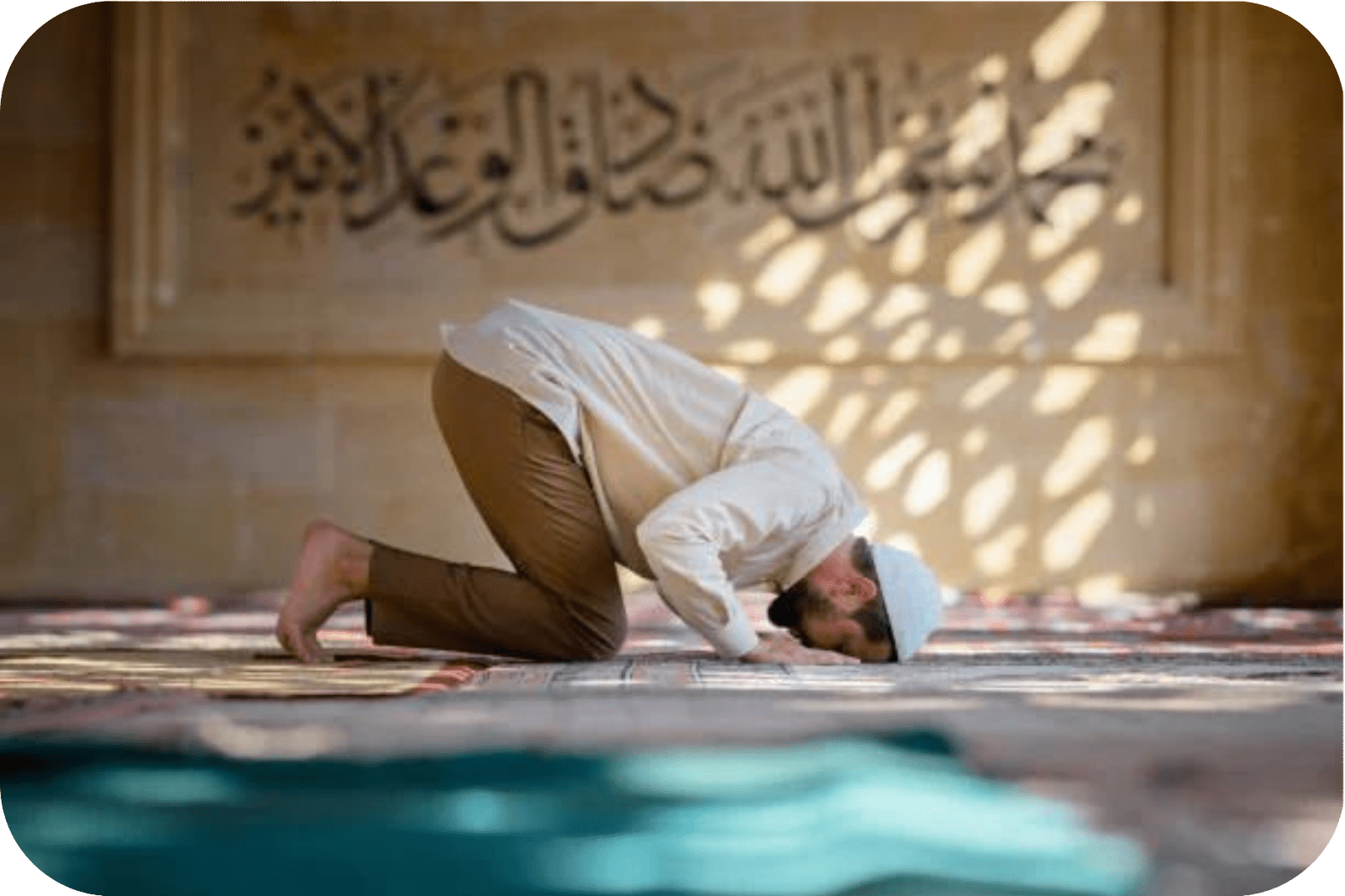How to Pray Janazah (Funeral) Prayer - Step by Step Guide
How to Pray Janazah (Funeral) Prayer - Step by Step Guide

When a loved one passes away, it is a time of grief and reflection. In Islamic tradition, one of the ways to honor the deceased is by performing the Janazah prayer, also known as the Funeral prayer. This prayer holds a special significance as it is a final farewell to the departed soul.
The Janazah prayer is a unique form of prayer that is performed specifically for the deceased. It is a collective prayer offered by the Muslim community to seek forgiveness, mercy, and blessings for the departed soul. This prayer is a way to show respect and express gratitude for the life that was lived.
In this step by step guide, we'll delve into what Janazah prayer is and how it's performed. Whether you're new to this prayer or looking to enhance your understanding, we are here to help you navigate this spiritual practice with ease and devotion.
What is Janazah (Funeral) Prayer?
Janazah prayer, also known as the funeral prayer, is a special prayer held to honor someone who has passed away and to ask Allah for forgiveness on their behalf. It's a significant part of Islamic funeral customs and is seen as a duty for the community (called fard kifayah) in Islam.
Prophet Muhammad (peace be upon him) once said that:
"Whoever joins the funeral procession and offers the funeral prayer will receive a reward similar to one Qirat, and those who stay until the burial will get a reward like two Qirats. When asked what two Qirats mean, he explained it's as big as two huge mountains, showing how valuable this act is."
(Sahih Al-Bukhari)
The way the Janazah prayer is done is quite simple. It involves four takbirs, which are moments when we raise our hands and say Allahu Akbar, along with reciting verses from the Quran and making special prayers. In understanding the importance of the Janazah Prayer, let's explore its purpose and significance in Islamic.
The Purpose of the Janazah Prayer
When we understand why we perform the Janazah prayer, it helps us value this important act even more. The main purpose is to show respect to the person who has passed away. By coming together as a community to pray for them, we show appreciation for their life, remember their good deeds, and thank them for the time we had together.
In addition, the Janazah prayer provides an opportunity to seek forgiveness on behalf of the deceased. It is believed that through this prayer, we can beseech Allah to forgive any sins or shortcomings the departed soul may have had during their lifetime. It is a means to pray for their soul's purification and acceptance into the mercy of Allah.
Lastly, the Janazah prayer fosters unity and support within the community during times of loss and grief. It provides solace to the family and friends of the deceased, reminding them that they are not alone in their sorrow. It strengthens the bonds of compassion and solidarity within the Muslim community.
Step-by-Step Guide to Praying Janazah Prayer
1. Say the first Takbeer
Begin by saying "Allahu Akbar" (Allah is the Greatest) and raise both hands up to your earlobes. Then, place your right hand over your left hand, resting them on your chest. This gesture signifies your readiness to commence the Janazah Prayer.
2. Seek refuge from the Shaytan (devil)
Seek refuge in Allah from the accursed Shaytan by saying, "A'udhu billahi minash-shaitanir-rajim" (I seek refuge in Allah from the accursed Shaytan). This act serves as a reminder to seek protection from any distractions or negative influences during the prayer.
3. Recite Surah Al-Fatihah and a short surah
Recite Surah Al-Fatihah, the opening chapter of the Quran, followed by a short surah or a portion of a surah. This recitation demonstrates your devotion and connection to Allah.
4. Say the second Takbeer
Say "Allahu Akbar" again, either raising your hands to your earlobes or leaving them as they are. Both options are permissible and do not affect the validity of the prayer.
5. Recite prayers on Prophet Muhammad (peace be upon him)
Recite prayers (blessings) on Prophet Muhammad (peace be upon him) as you would at the end of a regular prayer. This act of sending blessings to the Prophet Muhammad (peace be upon him) is a way to show respect and seek his intercession.
6. Say the third Takbeer
Say "Allahu Akbar" for the third time, following the same options as mentioned before.
7. Make dua (supplication) for the deceased
Take a moment to make duas (supplications) for the deceased. You can choose from a variety of recommended supplications from the Prophet Muhammad (peace be upon him). One popular supplication is:
"O Allah, forgive our living and our dead, those present and those absent, our young and our old, our males and our females. O Allah, whom among us You keep alive, then let such a life be upon Islam, and whom among us You take unto Yourself, then let such a death be upon faith. O Allah, do not deprive us of his reward and do not let us stray after him."
(Sahih Al-Bukhari)
8. Say the fourth Takbeer and pause
Say "Allahu Akbar" for the fourth time and pause for a little while. You can choose to raise your hands to your earlobes or leave them as they are. Some scholars suggest reciting general supplications for yourself, your family, friends, and all Muslims during this period.
9. End with Tasleem (Salutation)
Conclude the Janazah Prayer by saying one Tasleem (Salutation) to the right, saying "Assalaamu 'alaykum wa rahmat-Allaah" (Peace be upon you and the mercy of Allah). It is also acceptable to perform the Tasleem on both sides, as in a regular prayer.
By following these step-by-step instructions, you can perform the Janazah Prayer with ease and reverence. May Allah accept your prayers and grant peace and mercy to the deceased.
Rules of Janazah Prayer
1. Attire and Footwear
When performing the Janazah Prayer, some individuals choose to pray while wearing shoes, while others prefer to stand on their shoes. If you decide to pray while wearing shoes, it is essential that both the shoes and the ground beneath them are clean and pure. However, it is generally recommended to avoid standing on shoes during the prayer. Instead, stand directly on the ground, or if you prefer, you can place a clean handkerchief on the ground and stand on it.
2. Presence of the Deceased
The Janazah Prayer is specifically intended for the deceased, and it is necessary for the body of the deceased to be physically present. Praying the Janazah Prayer for someone who is absent is not permissible. Therefore, ensure that the body of the deceased is present before proceeding with the prayer.
3. Position of the Imam
It is recommended (mustahabb) for the Imam, the person leading the Janazah Prayer, to stand in front of the chest of the deceased. This positioning allows the Imam to lead the prayer while facing the direction of the deceased's head. This practice is considered respectful and appropriate during the Janazah Prayer.
Conclusion
In times of loss and grief, the Janazah (Funeral) Prayer holds a special place in Islamic tradition. It is a way to honor the departed soul, seek forgiveness on their behalf, express gratitude for their life, and find solace in the unity of the Muslim community.
By following the step-by-step guide provided, you can perform the Janazah Prayer with ease and devotion. May the Janazah Prayer serve as a means to offer comfort, peace, and blessings to the departed soul and bring solace to those left behind.
Selling at Riwaya
Are you a seller of prayer essentials such as prayer mats and prayer beads? Riwaya welcomes vendors like you to showcase your products on our platform.
By joining Riwaya as a seller, you can reach a wide audience of Muslim customers looking for high-quality prayer essentials. Whether you offer traditional prayer mats with intricate designs or modern prayer beads for Dhikr, Riwaya provides a platform for you to showcase your unique products.
Join us at Riwaya and become part of a community dedicated to providing exceptional prayer essentials to Muslims around the globe. Let your products shine and make a meaningful impact on the spiritual journeys of our customers.
FAQs
Q1: Can the Janazah prayer be performed alone?
Yes, it is permissible to perform the Janazah prayer alone without any difference of opinions among scholars. However, it is recommended to perform the Janazah prayer in congregation, as it is considered a communal obligation (fard kifayah). Performing the Janazah prayer in congregation allows for a greater sense of unity and support among the community members.
Q2: How long after death is the Janazah prayer performed?
The Janazah prayer should be performed as soon as possible after the death of a Muslim. Ideally, it should be performed before the burial takes place. This is to ensure that the deceased is honored and given a proper farewell before being laid to rest. However, if it is not possible to perform the Janazah prayer before the burial, it can be performed after the burial as well. The timing may vary depending on the circumstances and cultural practices of the community.
Q3: Is Wudu (ablution) required for the Janazah prayer?
Performing the funeral prayer without Wudu is not permissible, as purity through Wudu is a requirement for the prayer. Without Wudu, the prayer is invalid. Therefore, it's incorrect to assume that the prayer can be performed without Wudu.
Q4: What happens after the Janazah prayer?
After the Janazah prayer, the deceased is taken to the burial site for burial. The body is prepared for burial, which may include washing, shrouding, and placing the body in a simple casket. Family and friends may gather to offer condolences and support to the family of the deceased. It is a time for reflection, remembrance, and seeking forgiveness for the deceased. The burial is typically conducted with simplicity and humility, as Islam emphasizes the transient nature of life and the importance of focusing on the hereafter.
Q5: Are women allowed to attend funerals and participate in the Janazah prayer in Islam?
Praying the janazah (funeral) prayer is permissible for both men and women. But women should not follow the funeral procession to the graveyard. Also women are not allowed to visit graves.


